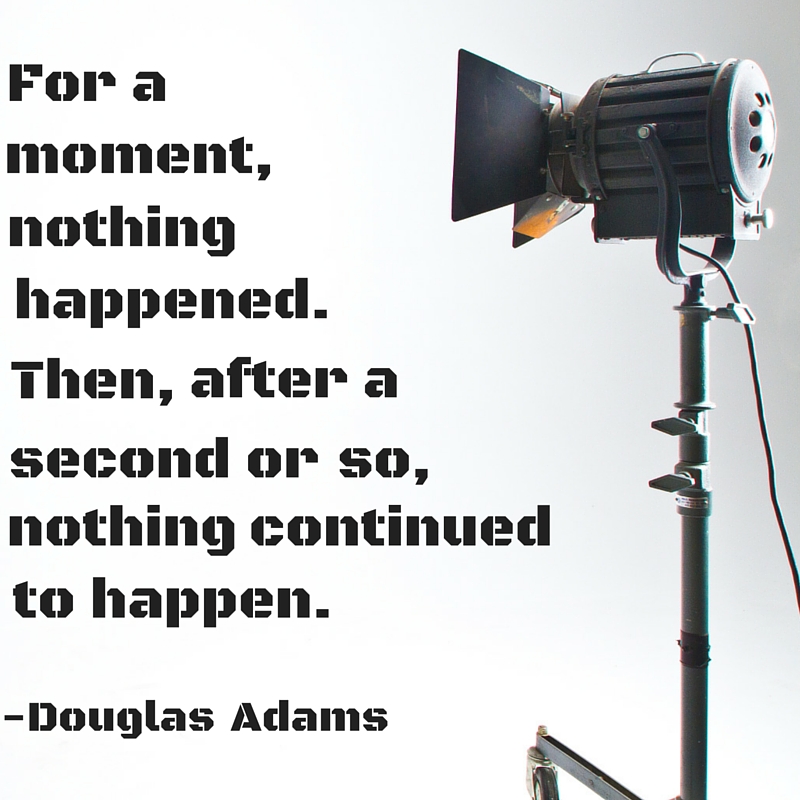
That’s what happens when writers like me are too damn scared to put more words on a page. And that’s the worst.
Getting words on the page is vital to getting our stories written. Each word on the page is an act of courage and being courageous, especially for long stretches of time, is not always easy, not to say excruciatingly difficult.
I’m currently studying improvisational theatre, where I’m learning to overcome my fear of public speaking. I’m also learning to overcome my fear of not knowing what happens next in my story.
Improvisational theatre is the art of performing ad-lib. It is the ability to get on stage and perform without a script or any previous preparation. And while improvisation is the ability to make things up as you perform, there are some rules. Those rules are helping me write my story.
-
Say “yes and…”
One of the most important rules of improvisation is to accept as well as build on what was previously said. With this principle in place, improvisational actors can never make a mistake so long as their fellow actors accept all offers made during the course of scene.
This is in fact harder than it sounds.
As writers, we learn early on that conflict is vital. But according to the “yes and…” principle, the scene performed is built, not on conflict, but on acceptance. One person makes a statement and the other person has no choice but to build upon that statement, even if building upon the previous statement means accepting that he is a an extremely untalented individual still living with his parents at the age of 35.
However, what is important to remember, is that by saying “yes and…” actors are in fact deepening the storyline, making it rich and compelling.
Applying the principle of “yes and…” to the writing process means acceptance of the words you just wrote coming out of your character’s mouth. It also means that the other characters, those participating in the dialogue, are also accepting the offer made and building upon them.
Here’s an example of how it played out in my writing:
“Don’t you think 12 years to get some details about your mother is long enough? There’s nothing you can tell me that will make me hate her more than I already do. I really don’t care how complicated or sad her life was with you. I want you to tell me about it. Now.”
Floretta stared at Eve. Eve stared back.
“I’m waiting,” said Eve.
“Things aren’t always what they seem, my dear. Life is a complicated mystery we are all trying to figure out.”
“You’re just stalling,” said Eve.
And here’s where I got stuck. Eve, my 12-year-old orphaned protagonist called me (and Floretta) out on it.
Instead of having Floretta say “no I’m not”, I had Floretta accept Eve’s assertion and build on it.
“Yes,” replied Floretta, “I am.”
“I do not want to tell you about the terrible relationship between your parents and why your mother had to come here. I do not want to explain to you why your mother left you and why you have grown up by yourself. And finally, I do not want to tell you, that despite all of these terrible things, it is you who must save her.”
-
Don’t ask – assume.
Another rule of improvisation begs that you provide information instead of asking for it.
According to Charna Halpern, Del Close and Kim “Howard” Johnson, authors of Truth in Comedy, “He who gives information is a gift-giver; he who asks questions is a thief.”
When you step out onto that stage, you have no idea what’s going to happen. In fact you have no idea who you are, or who the other person on stage is either. Instinctively, you want to ask questions. But questions are a burden that force your fellow actor to come up with answers. So giving the answers is a far better approach.
You can’t go wrong in improvisation so long as your partner accepts your assumptions – your gifts. But when you write, not thinking through an assumption can have you writing up a scene that you just don’t need.
As writers, many of the assumptions we make on the page are the result of our instinct. Many times I fear my instinct. But lucky for me, I have Debra Kamin to set me straight: “instincts are great; what screws you over are your inhibitions.”
And my thought is this: even if you write that extra scene you don’t need. If you carry along the story and it doesn’t work, you’ll know that at some point and you’ll go back and fix it.
Writing is a process. It means not going to get it right the first time. It means that I’ll keep working on my plot, themes and characters for a long time. But first I need to spend lots of time writing. Using improvisation techniques will continue to help me get deeper into my story.
Were you able to implement these techniques in your writing? Did it help? Let me know in the comments below.